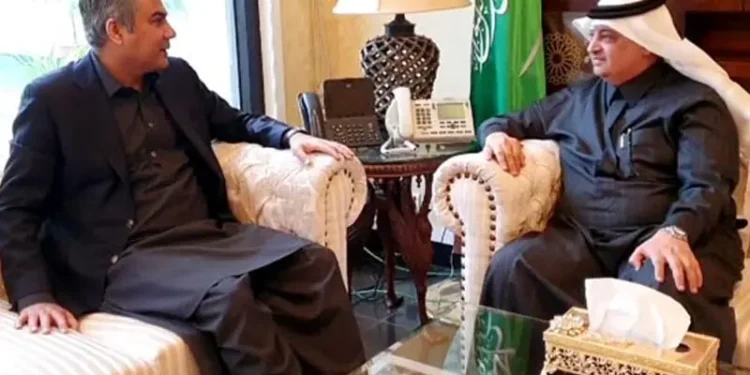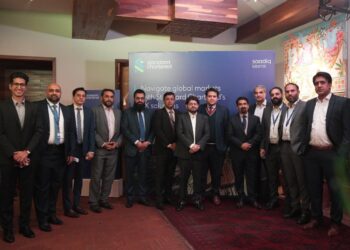In a significant diplomatic engagement, Federal Interior Minister Mohsin Naqvi held a meeting with the Saudi Ambassador to Pakistan, Nawaf bin Saeed Ahmed Al-Maliki, at the Saudi Embassy located in Islamabad’s Diplomatic Enclave. During the meeting, Minister Naqvi expressed deep gratitude to the Kingdom of Saudi Arabia for playing a sincere, brotherly, and effective role in helping ease tensions between Pakistan and India.
The discussion highlighted the historical friendship between Pakistan and Saudi Arabia, cooperation in various areas of mutual interest, and ongoing efforts to strengthen bilateral ties. The meeting also touched upon domestic challenges, including Pakistan’s crackdown on the begging mafia operating in Saudi Arabia, reflecting the multifaceted nature of collaboration between the two nations.
Saudi Arabia’s Mediation Role in Pak-India Tensions
For decades, Pakistan and India have faced strained relations due to unresolved disputes, most notably the Kashmir issue, cross-border conflicts, and security challenges. Over the years, Saudi Arabia has emerged as a key regional player and mediator, often extending diplomatic support to ease hostilities between the two nuclear-armed neighbors.
Minister Mohsin Naqvi acknowledged this role, stating that Saudi Arabia has stood by Pakistan in times of both war and peace, offering not only political backing but also diplomatic initiatives that have helped lower the temperature during critical standoffs.
This acknowledgment reflects Islamabad’s recognition of Riyadh’s ability to influence peace and stability in South Asia, given the Kingdom’s strong relations with both Pakistan and India as well as its status as a central player in the Muslim world.
Historical Context: Pakistan-Saudi Arabia Relations
The meeting also reaffirmed the enduring relationship between Pakistan and Saudi Arabia, which spans more than seven decades. Established shortly after Pakistan’s independence in 1947, the bond has been defined by strategic cooperation, religious affinity, and shared cultural values.
Key Highlights of the Relationship:
- Strategic Allies: Saudi Arabia has consistently extended political and economic support to Pakistan during critical times, including wars with India in 1965 and 1971, as well as during international sanctions.
- Economic Support: The Kingdom remains one of Pakistan’s largest sources of oil imports and has provided financial aid, loans, and deferred oil payment facilities to stabilize Pakistan’s economy.
- Labor Force Contribution: More than 2.7 million Pakistanis work in Saudi Arabia, making it one of the largest destinations for Pakistani expatriates. Their remittances are a crucial part of Pakistan’s foreign exchange reserves.
- Religious Ties: Saudi Arabia is home to the holiest Islamic sites in Makkah and Madinah, strengthening the spiritual bond between the people of the two nations.
Minister Naqvi highlighted that this brotherhood has “withstood every test of time,” underscoring the resilience of bilateral relations despite changing global dynamics.
Focus on Security and Crackdown Against Begging Mafia
Another critical issue discussed during the meeting was the ongoing crackdown against organized begging mafias exploiting Pakistani citizens in Saudi Arabia. Minister Naqvi informed Ambassador Al-Maliki that Pakistan has adopted a zero-tolerance policy against these criminal networks, many of which smuggle vulnerable individuals abroad under the guise of employment, only to exploit them in begging rings.
The Interior Minister assured the Saudi government that Pakistan is taking stringent measures against human trafficking networks and is working closely with Saudi authorities to curb this menace. This crackdown is aimed not only at protecting the dignity of Pakistani citizens abroad but also at strengthening the reputation of Pakistan’s workforce in Saudi Arabia.
Saudi Arabia’s Response: Commitment to Strengthening Ties
Responding to Minister Naqvi’s remarks, Ambassador Nawaf bin Saeed Ahmed Al-Maliki reaffirmed Riyadh’s commitment to Pakistan, stating:
“Pakistan is our brotherly and friendly country. Saudi Arabia attaches great importance to relations with Pakistan, and our cooperation will continue to grow in every field.”
The ambassador’s words reflected the Kingdom’s long-standing policy of treating Pakistan as a strategic ally and trusted partner, not only in South Asia but also within the broader Muslim Ummah.
Saudi Arabia’s Role in Regional and Global Affairs
Saudi Arabia’s involvement in easing tensions between Pakistan and India is part of its broader foreign policy of promoting peace and stability in the region. With its growing global clout, particularly as a member of the G20 and the host of multiple international summits, Riyadh has positioned itself as a bridge between conflicting states.
In South Asia, Saudi Arabia’s ability to engage both New Delhi and Islamabad makes it a valuable mediator. Beyond South Asia, the Kingdom also plays an active role in Middle Eastern peace initiatives, Islamic solidarity, and international counter-terrorism efforts.
Economic Dimension of Pak-Saudi Relations
The meeting also comes at a time when Pakistan is seeking to strengthen economic ties with Saudi Arabia. The Kingdom has pledged billions of dollars in investment in Pakistan’s energy, infrastructure, and mining sectors, including the much-anticipated Saudi Aramco oil refinery project in Gwadar.
Moreover, Saudi Arabia remains one of Pakistan’s largest remittance sources, with expatriates sending home over $6 billion annually. These remittances not only support millions of families but also play a crucial role in balancing Pakistan’s current account deficit.
The opening of new avenues of cooperation, including tourism, agriculture, and IT, is also on the agenda, further diversifying the scope of bilateral relations.
Strengthening People-to-People Relations
Beyond diplomacy and economics, Pakistan and Saudi Arabia share a unique people-to-people connection. Millions of Pakistanis visit Saudi Arabia annually for Hajj and Umrah pilgrimages, cementing the spiritual bond between the two countries.
Additionally, Saudi Arabia frequently offers scholarships, training programs, and healthcare facilities to Pakistani citizens, while Pakistan continues to provide skilled manpower, military training, and cultural exchange.
Minister Naqvi’s remarks about “support in both war and peace” resonate strongly with this reality, emphasizing that the bilateral relationship is not transactional but deeply rooted in shared history, values, and mutual respect.
Geopolitical Implications of the Meeting
Diplomatic analysts suggest that the timing of this meeting is particularly important, given the geopolitical tensions in South Asia and the broader Middle Eastern shifts under Saudi Arabia’s Vision 2030 initiative.
- For Pakistan, Saudi Arabia’s backing provides reassurance during times of uncertainty with India and offers critical economic and diplomatic support.
- For Saudi Arabia, maintaining strong relations with Pakistan strengthens its strategic depth in South Asia and enhances cooperation within the Muslim world.
This alignment not only benefits both nations bilaterally but also contributes to regional peace, stability, and economic integration.
Conclusion: A Testament to Enduring Brotherhood
The meeting between Interior Minister Mohsin Naqvi and Saudi Ambassador Nawaf bin Saeed Ahmed Al-Maliki was more than just a routine diplomatic interaction. It was a reaffirmation of the deep-rooted brotherhood between Pakistan and Saudi Arabia, built on decades of cooperation, mutual trust, and unwavering support.
By appreciating Saudi Arabia’s role in easing Pak-India tensions, addressing the crackdown on begging mafias, and reiterating the shared commitment to bilateral ties, the meeting highlighted the multifaceted nature of the Pakistan-Saudi partnership.
As both nations continue to strengthen their collaboration in politics, security, economy, and culture, their alliance remains a cornerstone of stability not only for South Asia but also for the wider Islamic world.

























